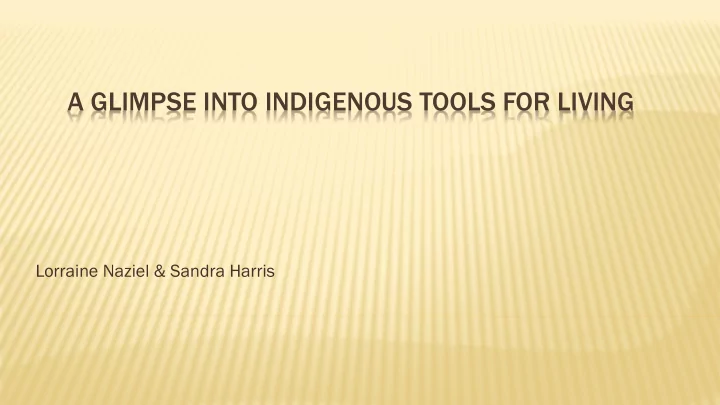

A GLIMPSE INTO INDIGENOUS TOOLS FOR LIVING Lorraine Naziel & Sandra Harris
WELCOME & INTRODUCTIONS Gratitude to the unceded Coast Salish Territories – the Squamish, Musqueum & Tsleil-Waututh Wilawhl (Lorraine Naziel) & Wii Esdes (Sandra Harris), Wet’suwet’en Nation Consultant, Respecting Tobacco & a Program Developer, Planning Mentor. Both are AFOT/IFOT Practitioners & IFOT Coaches in the IFOT training program. Main lifestyle; traditional healing (learning), land based practices & integration of shamanic healing and Reiki into every day life.
WELCOME Two Eyed Seeing Approach Medicines, water, land, interconnectedness, collective, Life, dreams & spirituality are all here in the room, to hold our space Lets stop for a moment and just sit, feet on the floor, experiential to do Check in to your body Being Together Guidelines
OVERVIEW Welcome & Introductions Indigenous Tools for Living – what it is. Today is is ju just a a drop in in the e bu bucket! We Carry Our History With Us Experientials: Felt Sense, Cedar roll & Paper exercise Animal Lemon Two Words Questions?
INDIGENOUS TOOLS FOR LIVING Indigenous Tools for Living is a 3-day training on how to work with and sit beside complex trauma. Though the training will benefit clinicians, it is also specifically designed for frontline non-clinical workers in social work, victim services, first responders and similar professions. It is facilitated by instructors and Elders from the Indigenous Focusing Oriented & Complex Therapy (IFOT) Program, and is clinically supervised by Shirley Turcotte, RCC.
APPLIED KNOWLEDGE ITFL emphasizes knowledge and application through classroom instruction, applied scenario-based learning, and clinical practice and supervision (when taught to clinicians). A variety of Indigenous treatment modalities are woven throughout, including experiential exercises, storytelling, ceremonial processes and land-based healing techniques. Together these provide concrete tools and approaches for working with complex trauma in ways that avoid burnout and triggering, while at the same time maximizing impact and achieving better outcomes.
• INDIGENOUS HELPERS: Comes from a place of Wiggus, respect for all that is (we are One) or Lax Yip, being of the Land; indigenous epistemology (how knowledge is known) & pedagogy (how knowledge can be taught) of All My Relations ; “Oneness” or holism (Indigenous Epistemologies and Pedagogies) Asma-na-hi Antoine, Rachel Mason, Roberta Mason, Sophia Palahicky, and Carmen Rodriguez de France) And body centered – our bodies hold ‘stress or trouble’, across generations, collectively and personally complex trauma Experiential: Felt sense – someone you don’t know, you love and all that is
WE CARRY OUR HISTORY Understanding our History – We Carry our History, sovereignty, big love ( connections/resilience) and collective hurts from oppression and colonization (detachment; wounded); notice your felt sense BIG LOVE of Life and Land, ie Sacred – provides Connection Land is Medicine My medicines; Overview - cedar, stones, water, and how to lean into land to create a healing space Experiential: Cedar Roll example and paper exercise
LEMON EXERCISE What is vicarious trauma or secondary post traumatic stress disorder? Protecting your center to be able to hear trauma without being traumatized by it Body responses to trauma Experiential: Lemon Exercise& felt sense Reaction Seeking Balance
IF YOU WERE A… Transformation: animals as helpers Triggers can be helpers too If in reaction place _ some ITFl, cultural practices & other ways Experiential: How to transform and lean into animals to become un-triggered and fully stay present in difficult situations with difficult people.
PERSONAL EXPERIENCES: What Indigenous Tools for Living and IFOT training did for us. Sandra Lorraine
QUESTIONS? Wrap Up Exercise: “Two Words” Final Check in – Clearing Space, Mine exercise
“We are in connection and in relationship with water, air, fire, earth, and all the relatives who have wings, fins, roots and paws and this connection flows forwards and backwards in time, through the generations. Trauma fallout is a relationship issue and we are in relationship with life and land through the generations.” Shirley Turcotte Contact for Indigenous Tools for Living: Belinda Lacombe: Email is blacombe2015@gmail.com
Recommend
More recommend